Dirt stung her face and bounced off her goggles like gravel on a windshield from a speeding truck.
She flinched, and crouched lower in the saddle.
Beneath her, the striving, rushing Thoroughbred waited for a signal: where did she want him to go? They’d rocketed from the gait and had surged only a few paces when, in her peripheral vision, a solid wall of galloping horses squeezed from the right toward the rail; and, horses to her left struggled to hold their position.
In the thick of her first race, the petite, 21-year-old “girl jockey” had mere seconds to make a plan.
“There’s nothing in the world that could have prepared me,” says NBC Sports broadcaster and former jockey Donna Barton Brothers. “Within a couple of strides of leaving the gait, there was so much going on, and within moments, the dirt was flying back and hitting me in the face.”
More dirt ricocheted off her goggles, as she recoiled again, and then a few strides later, she shifted her attention from the uncomfortable sensation to the race itself.
“At one point I was crouched down trying to avoid the dirt—it really stings when it hits —but, at the same time, there was a race going on all around me,” she says.
And then, all of a sudden the rat-tat-tat was gone, fading away as she sunk into the zone. Aiming her horse through the traffic, she rode out her first race with the undeniable goal to win, the adrenalin urging her on.
Up until that first race, Brothers had been a bit blasé about the idea of being a jockey.
“Everybody we knew growing up were jockeys,” she says. “My mother Patti Barton was a jockey, all of her friends were, and both my sister and younger brother were going to be jockeys; I thought maybe I would be a lawyer or a vet.”
But on that maiden ride, something clicked.
Having entered the race somewhat reluctantly—only to rule out becoming a jockey like so many in her family —it unexpectedly ignited something within her. The thrill of it was so surprising and so completely different than her previous work as an exercise rider.
With a new focus and steely determination, she committed herself to making it in the male-dominated sport. Her first goal was to become as strong as possible so she could endure the sport’s physical demands.
“There were so many challenges revealed to me in that first race. There was so much to figure out in the first few strides. And one of the biggest challenges was becoming fit and strong enough to do the work,” she says.
But, by adhering to a strict workout and dietary regimen, Brothers was able to build muscle and strength enough to race alongside the big boys of the business. And win.
“There’s that saying that a man’s body can take a Twinkie and figure out how to make muscle out of it, and a woman’s body can take a dinner of lean chicken breast and a salad with a little oil drizzled over it, and figure out how to turn it into fat,” she says, chuckling.
Figuring out how to “trick” her body, she altered her diet to avoid mixing carbohydrates and proteins in the same meal. She gave her body what it needed, but avoided fat-producing foods.
And she spent hours every day riding horses, running, and lifting weights!
“I got on a lot of horses for a couple of years” to build leg strength. “I rode about 12 horses in the morning and would ride six or seven (in races) in the afternoon.”
Once she built her muscle and finessed her style, Brothers went on to ride to victory over 1,100 times during a racing career that began in 1987 and concluded, upon retirement and the decision to marry race trainer Frankie Brothers, in 1998.
Although the wins put her on the map, it was a second-place finish she counts as her biggest career highlight.
Racing with all their courage and determination in the 1995 Breeders’ Cup Juvenile, Brothers and her mount Hennessy were barely edged out by jockey Mike Smith, who rode Unbridled Song to victory.
“It was my most memorable ride because I loved that horse so much. He was such a feel-good horse, sired by Storm Cat,” Brothers says. “He had a ton of energy, but unlike so many other horses I’ve been on, if he was bucking and playing, he’d stop as soon as he felt me come loose. He was a horse who felt good, and he wanted you to come along for the ride.”
When Brothers eventually hung up her silks— she made the decision after the twin emotions of “thrill and fear” she felt barreling down the stretch began to be overshadowed by fear alone—her professional life continued to develop briskly, catapulting her onto network television.
First working as a television commentator for a Churchill Downs handicapping show, Brothers was discovered by NBC in 2000.
Scouts had come to scope out Churchill Downs in preparation for Derby coverage planned for the following year, when they saw Brothers on air.
“They asked if I’d be interested in working for NBC, and in this business, I’ve learned to say, ‘Sure!’ ”
But as quick as she was at shifting gears, even Brothers was a little startled by how rapidly her first appearance was scheduled for national television.
She figured she’d be slated to cover the Kentucky Derby in 2001. Oh what a surprise when she learned she was to cover the Breeders’ Cup, months after that first meeting.
“My biggest problem at that point was that I didn’t have a real comfort level in front of a camera yet, and the idea of going before a national audience” was a bit daunting. “We’re talking five hours of live TV, eight races, and a national audience.”
But she rose to the occasion. Just like she had in her first race.
After spending the day conducting post-race interviews with jockeys, she learned that one viewer had deemed her telecasts to be “fluff.”
Brothers took the criticism to heart. And when she later prepared for her Kentucky Derby interviews, made a point of learning everything she could about each horse and rider in the game.
The real story, she understood, was in the details of a rider’s life—had a jockey lost someone close to them that year, or had a baby; or, was this their first time in the race?
On note cards, she kept horse and jockey stats, and jotted down questions.
And when she rode out on horseback to meet the winner, she was always prepared.
Always, that is, until Calvin Borel came flying across the finish line in 2007 aboard Street Sense.
“I rode up to Calvin and I had these 5 by 8 index cards in my saddle bag. I had his past performances, and some interesting facts, like, Calvin was Street Sense’s only rider,” Brothers recalls.
But, all of that preparation went out the window when she pulled up to the emotional Derby winner.
With tears in his eyes, he told Brothers he wished his mother and father could be there to see his victory, and Brothers wound up asking him about his family, particularly his brother, who was there that day in the stands. His brother had reared Borel, and this fact was what stood out in Brothers mind on the chaotic racetrack after the win.
The other questions she’d prepared were forgotten in a moment of stage fright, she admits. After she concluded the interview by telling the national audience that it was an emotional day for Calvin Borel, she headed back to the office with her head full of worry.
When a friend approached and asked her how her interview went. She replied anxiously: “I’m so fired.”
“I had forgotten every question I had for him. I had reins in one hand and a microphone in another, so I couldn’t reach into my saddle bag for my notes,” she says.
She told the Daily Racing Form in a Q&A interview that she had three or four questions for Borel, but became “so caught up in his story” that she never used them.
But, Brothers was her worst critic that day. Not only was she not fired, she was personally congratulated by NBC executives for her “great interview.”
“I thought, ‘Did they see the same interview I just saw?’ But, when I watched it later in re-runs, I realized that the reason they liked that interview so much was because I forgot my notes and I listened to what he said, and responded,” she says.
Today, Brothers is a poised sportscaster. She covered the Rolex Kentucky Three Day last weekend, and will be on the turf this Saturday at racing’s most glamorous race, the Kentucky Derby. Stay tuned!
This story is repeated from a February interview with Donna Brothers, which was published in OffTrackThoroughbreds.com.
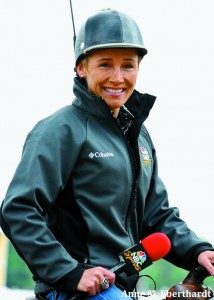
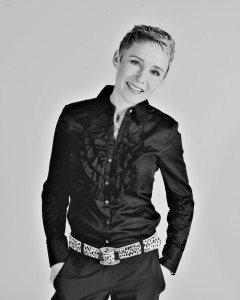
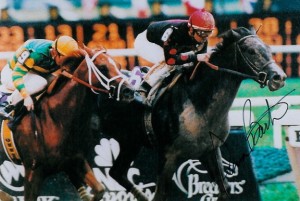
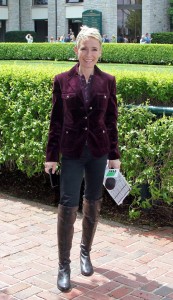
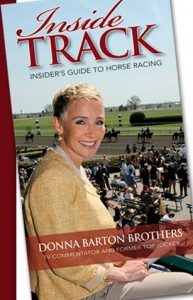

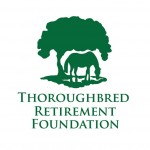
Absolutely great from grueling workouts in preparation to be riding in the most celebrated race in the business.Who could be better prepared to talk to the participants of the greatest sport, in mine and many others estimation. Greatstory and life to be honored!